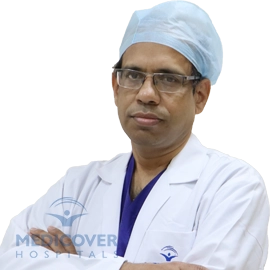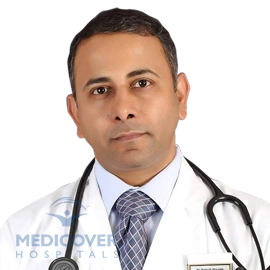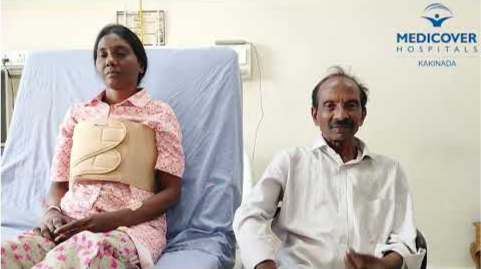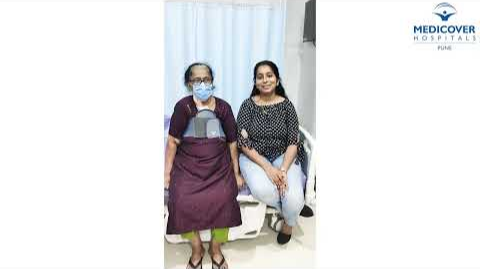What is Mitral Valve Replacement?
Mitral Valve Replacement (MVR) is a specialized cardiac surgery performed when the mitral valve, the valve that controls blood flow from the left atrium to the left ventricle, becomes severely diseased or damaged.
When this valve does not function properly, it can cause mitral valve stenosis (narrowing) or mitral valve regurgitation (leakage). Both conditions can strain the heart, leading to shortness of breath, irregular heartbeat, fatigue, pulmonary hypertension, and even heart failure.
In such cases, when repair is not possible, the valve is replaced with an artificial one. The goal of the procedure is to restore normal blood circulation, relieve symptoms, prevent further complications, and improve long-term survival.
Types of Mitral Valve Replacement
The choice of valve depends on a patient's age, lifestyle, and medical condition. The main types are:
Mechanical Valve Replacement
- Made from highly durable materials such as carbon or titanium.
- Designed to last a lifetime (20+ years).
- Requires lifelong anticoagulation therapy (blood thinners like warfarin) to prevent blood clots.
- Typically recommended for younger patients who can manage long-term medication.
Biological (Tissue) Valve Replacement
- Made from animal tissue (usually pig or cow) or sometimes donated human tissue.
- Lifespan is about 10 to 15 years.
- Usually does not require long-term use of blood thinners.
- Often recommended for older patients or those who cannot take anticoagulants safely
Surgical Approaches for Mitral Valve Replacement
Several surgical techniques are available depending on the complexity of the disease, patient health, and hospital expertise:
- Median Sternotomy: This is the traditional open-heart surgery approach, where the surgeon makes a vertical incision down the center of the chest and splits the breastbone to access the heart directly. It provides a full view of the heart and is used in complex cases.
- Minimally Invasive: This method involves a smaller incision on the right side of the chest, between the ribs. It avoids cutting through the breastbone, resulting in less pain, a smaller scar and faster recovery.
- Robotic-Assisted: The surgeon operates through tiny incisions with enhanced precision and control using robotic instruments. This is used in select cases where advanced technology is available. The robot is guided by the surgeon at a console, allowing for highly accurate movements and minimal trauma to surrounding tissues.
3 to 6 Hours
Surgery Duration
General Anesthesia
Anesthesia Used
6 Months
Full Recovery Timeline

What are the indications for Mitral Valve Replacement?
Mitral valve replacement may be indicated in the following situations:
- Severe Symptoms: Shortness of breath, fatigue, chest pain, or dizziness caused by a malfunctioning valve.
- Heart Failure: When the valve contributes to heart failure and reduces the heart's pumping efficiency.
- Mitral Valve Stenosis: Severe narrowing of the mitral valve restricting blood flow.
- Mitral Valve Regurgitation: Leakage of the valve, allowing blood to flow backward into the left atrium.
- Structural Damage: Congenital defects, infections (e.g., endocarditis), or other structural issues affecting valve function.
- Decreased Heart Function: Compromised pumping ability due to valve dysfunction.
- Failed Valve Repair: Prior attempts to repair the valve were unsuccessful.
- Chronic Atrial Fibrillation: Associated with mitral valve disease.
- Deterioration of Biological Valves: In patients with a previous biological valve replacement that has worn out over time.
What conditions does Mitral Valve Replacement treat?
This procedure primarily treats conditions affecting the mitral valve:
- Severe mitral stenosis (narrowing of the valve).
- Severe mitral regurgitation (leaky valve).
- Structural or congenital valve defects.
- Complications from previous valve repairs or replacements.
- Heart failure or other cardiac issues caused by valve dysfunction.
When would a doctor recommend Mitral Valve Replacement?
A cardiologist or cardiac surgeon may recommend the procedure when:
- The patient experiences symptoms that significantly affect quality of life, such as shortness of breath, fatigue, or chest discomfort.
- Imaging and tests show severe valve dysfunction or enlargement of the heart chambers.
- The patient is medically fit for surgery and other treatments are not effective.
- Valve repair is not possible, or prior repair attempts have failed.
Why is Mitral Valve Replacement done?
The primary goals of mitral valve replacement are to:
- Restore normal blood flow between the left atrium and left ventricle.
- Relieve symptoms such as shortness of breath, fatigue, and swelling.
- Prevent complications including heart failure, pulmonary hypertension, or stroke.
- Improve long-term survival and quality of life in patients with severe valve disease.
How should I prepare before Mitral Valve Replacement surgery?
Preparation involves medical, logistical, and emotional steps, including:
- Consultation: Meet with your cardiothoracic surgeon to understand the procedure, its benefits, risks, and expected outcomes.
- Medical Assessment: Complete a thorough evaluation, including blood tests, imaging scans, and electrocardiograms (ECG), to ensure you are fit for surgery.
- Medications: Inform your healthcare team about all medications, supplements, and herbs. Some medications may need to be adjusted or temporarily stopped.
- Lifestyle Changes: Follow recommendations such as quitting smoking, managing chronic conditions (diabetes, high blood pressure), and improving your diet.
- Mental Preparation: Learn about the procedure, its benefits and risks, and practice stress-relief techniques such as meditation or counseling.
- Logistical Arrangements: Arrange transportation to and from the hospital and plan for assistance at home during initial recovery.
- Hospital Stay Planning: Pack essential items, including comfortable clothing, toiletries, and personal necessities.
- Diet and Hydration: Follow preoperative dietary instructions; maintain hydration and a balanced diet to aid healing.
- Final Consultation: Review the surgery plan with your surgeon, address any last-minute concerns, and confirm all preparations.
What tests are done before Mitral Valve Replacement surgery?
Common preoperative tests include:
- Blood Tests: To check overall health, blood count, and clotting ability.
- Electrocardiogram (ECG): To assess heart rhythm and function.
- Echocardiogram: Ultrasound imaging of the heart to evaluate valve function and structure.
- Chest X-ray or CT Scan: To examine heart size, lungs, and surrounding structures.
- Coronary Angiography (if needed): To check for blocked arteries before surgery.
Should I stop eating, drinking, or taking medicines before Mitral Valve Replacement surgery?
- Fasting: Typically, you will need to fast (no food or drink) for several hours before surgery as instructed by your surgeon.
- Medications: Certain medications, especially blood thinners, may need to be temporarily stopped. Always follow your doctor's instructions.
- Routine Medications: Some medications may be taken with a small sip of water, confirm with your surgical team.
What happens before Mitral Valve Replacement surgery?
Before surgery, you will:
- Arrive at the hospital and check in at the preoperative unit.
- Change into a hospital gown and have an IV line started for fluids and medications.
- Meet the anesthesiologist to discuss anesthesia options and any concerns.
- Undergo final checks, including vital signs, blood work, and verification of surgical site.
- Be escorted to the operating room once everything is ready for the procedure.
How is Mitral Valve Replacement performed?
The mitral valve replacement procedure steps typically include:
- Anesthesia: The patient is placed under general anesthesia to ensure they are unconscious and pain-free during the surgery.
- Incision: A skilled surgeon makes an incision in the patient's chest. The location and size of the incision may vary based on the surgical approach chosen.
- Cardiopulmonary Bypass (CPB): In most cases, the surgery requires the use of a heart-lung machine, which temporarily takes over the functions of the heart and lungs. The blood is redirected away from the heart, allowing the surgeon to work on the mitral valve in a bloodless environment.
- Accessing the Heart: The surgeon gains access to the heart through the incision. This can involve separating the sternum (breastbone) and sometimes using rib spreaders to access the heart.
- Removing the Damaged Valve: The diseased or damaged mitral valve is carefully removed. The surgeon takes care to avoid damaging the surrounding tissues.
- Preparing the Valve Site: The valve site is carefully inspected and prepared to ensure proper attachment of the prosthetic valve.
- Prosthetic Valve Placement: The chosen prosthetic valve (mechanical or bioprosthetic) is securely sewn into place at the valve site. The surgeon ensures that the new valve functions properly and allows for optimal blood flow.
- Closing the Incision: After the prosthetic valve is in place and functioning correctly, the surgeon closes the incision. This may involve sutures, staples, or other closure methods.
- Weaning from the Heart-Lung Machine: If a heart-lung machine was used, the patient is gradually weaned off the machine, and the heart resumes its normal pumping function.
- Monitoring and Recovery: The patient is carefully monitored in the postoperative period. They may initially be taken to an intensive care unit (ICU) for close observation before transitioning to a regular hospital room.
- Recovery and Rehabilitation: As the patient recovers, they may participate in a cardiac rehabilitation program to gradually regain strength, mobility, and cardiovascular fitness.
Who performs Mitral Valve Replacement?
The procedure is performed by a cardiothoracic surgeon who specializes in heart surgery. A trained surgical team, including anesthesiologists, perfusionists (for the heart-lung machine), and nursing staff, assist during the operation.
What happens during Mitral Valve Replacement surgery?
During the procedure:
- The patient is anesthetized and carefully monitored.
- The surgeon removes the diseased valve and replaces it with a prosthetic one.
- Heart function is temporarily supported if a heart-lung machine is used.
- Once the new valve is in place, the incision is closed, and the patient begins the recovery process under close observation.
Recovery After Mitral Valve Replacement Surgery
Recovery after a mitral valve replacement surgery is gradual, involving healing, rehabilitation, and adjusting to changes in your cardiovascular system.
What should I expect immediately after mitral valve replacement surgery?
Immediately after the procedure:
- ICU Care: You will be closely monitored in the intensive care unit before moving to a regular hospital room.
- Pain Relief: Medications are provided to manage discomfort from the incision and chest tubes.
- Health Checks: Vital signs, heart function, and the surgical incision are regularly checked.
- Chest Tubes: Temporary drains may be in place to remove excess fluid and are removed as healing progresses.
When can I return to normal activities after mitral valve replacement surgery?
- Days to Weeks Post-Surgery: Start gentle walking to prevent blood clots and boost circulation. Breathing exercises help prevent lung infections. Diet usually progresses from liquids to solids, and incision care is essential.
- Weeks to Months Post-Surgery: Participate in cardiac rehabilitation programs to safely regain strength. Gradually increase activity levels, avoiding heavy lifting until cleared by your doctor. Follow-up visits are crucial to monitor healing and adjust medications as needed.
- Long-Term: Most patients return to regular daily activities within a few months, though full recovery varies depending on age, overall health, and any complications.
Are lifestyle changes required after recovery from mitral valve replacement surgery?
Yes, certain lifestyle adjustments support long-term heart health and recovery:
- Healthy Diet: Eat a balanced diet rich in fruits, vegetables, lean proteins, and whole grains.
- Regular Exercise: Engage in safe, doctor-approved physical activity to maintain cardiovascular health.
- Medication Compliance: Some patients may require long-term blood thinners or other cardiac medications.
- Stress Management: Practice relaxation techniques to reduce strain on the heart.
- Monitoring Symptoms: Be alert for chest pain, shortness of breath, irregular heartbeat, or unusual swelling and report them promptly.
- Follow-Up Care: Attend all scheduled medical appointments to ensure optimal heart function and long-term success of the valve replacement.
What Are The Benefits Of Mitral Valve Replacement Surgery?
Mitral valve replacement restores proper blood flow and heart function. Key benefits include:
- Improved Heart Function: Eliminates backward leakage (regurgitation) and normalizes blood circulation.
- Symptom Relief: Reduces fatigue, shortness of breath, and swelling caused by valve dysfunction.
- Prevents Heart Damage: Stops progressive heart failure and long-term damage to the heart muscle.
- Long-Term Survival: Mechanical valves offer long-lasting durability, often exceeding 20 years, with improved survival rates around 80%.
- Return to Normal Life: Most patients regain the ability to perform daily activities and resume normal routines.
What are the risks and complications of mitral valve replacement surgery?
Although generally safe, mitral valve replacement carries potential risks:
- Infection: At the surgical site or in the heart.
- Blood Clots: Particularly with mechanical valves, increasing risk of stroke or embolism.
- Valve Dysfunction: Rare complications with the prosthetic valve.
- Bleeding: Excessive bleeding during or after surgery may occur.
- Stroke: Small risk during or immediately after the procedure.
- Arrhythmias: Abnormal heart rhythms may develop post-surgery.
- Heart Failure: Some patients may experience ongoing heart failure symptoms if underlying conditions persist.
What are the side effects after mitral valve replacement surgery?
- Mild pain or discomfort at the incision site.
- Temporary fatigue and weakness during the initial recovery period.
- Bruising or swelling around the chest.
- Possible short-term arrhythmias as the heart adjusts to the new valve.
- Long-term effects may include lifelong medication use, especially blood thinners for mechanical valves.
What Is The Cost Of Mitral Valve Replacement Surgery?
The cost of mitral valve replacement in India varies depending on the hospital, type of valve, and procedure complexity, ranging from Rs. 160,000 to over Rs. 600000. Costs include surgery, hospital stay, anesthesia, medications, and pre- and post-procedure care.
Advanced procedures like Transcatheter Mitral Valve Replacement (TMVR) are more expensive than traditional open-heart surgery.
Factors affecting the cost include the type of valve (biological valves are usually cheaper than mechanical ones), surgical approach (traditional surgery costs less than minimally invasive or transcatheter methods), hospital and location, pre- and post-procedural care, and patient factors such as age, overall health, and lifestyle.













































